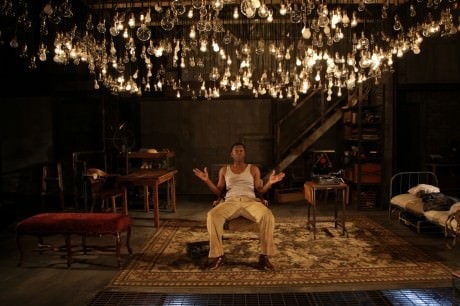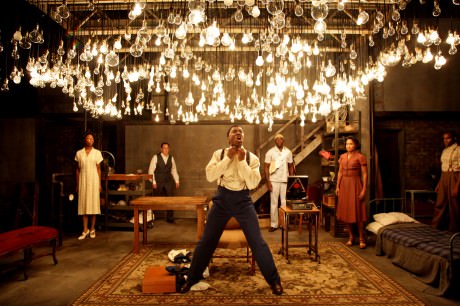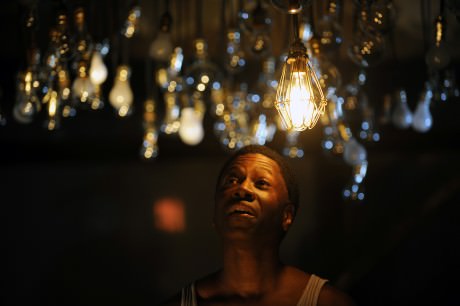‘I am invisible, understand, simply because people refuse to see me.’
– Ralph Ellison, Invisible Man
Everyone at some time has walked into a room and felt invisible. Who hasn’t had a moment of invisibility where they were seen, but felt totally unnoticed or weren’t allowed to be recognized. The feeling of invisibility is a universal human experience. For some that moment is just one. For others it’s a temporary situation, or it can be a state of being that last years…or even a lifetime.

The Studio Theatre opens it’s 2012-2013 season with Ralph Ellison’s 60 year-old literary masterpiece Invisible Man. Ambitious to be sure, this confident theatrical presentation (a co-production with Huntington Theatre Company, Boston, MA) directed by New York based Christopher McElroen, captures the epic scope of the lyrical first person novel, and displays an expressionistic and collage mix of artistic style. The play – like the novel – explores identity, racism, and ideology.
Invisible Man is a memory play, where the journey of the Invisible Man’s world ultimately lives inside his head. The Studio Theatre’s production of Invisible Man is a bold look into the past that digs deep, provides insight, and forces us to take a look ourselves… and the future. The themes are prophetic and resound loudly on the political drama of today.
Adapted by Oscar-nominated filmmaker Oren Jacoby (Best Documentary, Short Subjects for Sister Rose’s Passion (2004), this theatrical staging marks the first authorized adaptation of the novel in any medium by the Ellison Trust. The World premiere of the production took place in January of this year at Court Theatre in Chicago.
The nameless narrator starts out as a promising young student who wins a scholarship to a prestigious black college in the South. An encounter with a white Trustee of the college and a backstabbing betrayal derides his future and leads him to Harlem where he experiences a series of disillusionment and an embattled state of erasure. Maturing and transforming, he eventually embraces enlightenment, self-discovery, and social responsibility.
This is a tale of a black man’s search for visibility and identity in America. The Invisible Man is convinced that his existence depends on the approval and gaining the support of whites, the nameless narrator spends nearly 20 years trying to establish his humanity and worth in a society that refuses to see him as a human being. A story about innocence and human error, our protagonist struggles through illusion to eventually realizing that his life is not defined strictly by his race but by his willingness to accept personal responsibility for creating his own identity and life. The Invisible Man’s development is one from blindness and ignorance to enlightenment and truth. In other words, the darkness to light – his invisibility to visibility.
The play as with the novel, gains universality by the fact that the problems encountered by the Invisible Man are problems that most of us will encounter at some point in our lives. Consequently he discovers, who he is and what he is.
Technically, the shinning highlight is the luminous lighting design by Mary Louise Geiger. Creating a ceiling centerpiece of various lengths of dangling incandescent bulbs, Geiger has created the oppressive illusion of 1,369 bulbs of “stolen” electricity that our nameless narrator has wired in his Harlem basement home – the setting for Invisible Man. The intrigue of this centerpiece glow is glorious! The warmth illuminating from the centerpiece lighting, combined with Troy Hourie’s strategic basement home interior set design, and the trumpet moans and rhapsodizing flow of David Remedios’ sound design create an immediate tone and naturalistic air of authenticity for this theatrical. The choreography of Alex Koch/Imaginary Media’s projection designs are as complex, detailed, and richly textured as I’ve ever seen in a production.
Invisible Man is a perfect production to be performed in the round. As it is, the intimate space and size of the stage is physically challenging, when 8-10 performers are on the stage at once. To McElroen’s credit, he makes brilliant, inventive use of the entire space of The Metheny Theatre at The Studio Theatre, including regularly using the aisles and sides as entrances, exits, and ensemble staging.

The hallucinatory, blindfolded “Battle Royal” boxing scene that takes place early in Act 1, and later when Beethoven’s towering “Fifth Symphony” sets the tone for the hospital scene in Act 2 (the unnamed narrator lies terrified in bed after a blast at the paint company, flanked by nurses and a doctor) are two cinematic illustrations of McElroen’s exceptional style. I would have liked to have seen even more scenes reverberating with these vibrant, choreographed strokes. direction, and the surreal technical design spirited to the stage.
The ensemble cast of nine does an incredible job with what they are given, and they stay busy with wardrobe changes performing multiple roles, 3-4 characters per actor.
There is not a weak link among them. It’s the Invisible Man’s story, but the performances by Edward James Hyland (Mr Norton) and Johnny Lee Davenport (Bledsoe) are stunning. Brian D. Coates not only knows how to makes the most of his stage moments, as Peter Wheatstraw he also provides some much welcomed humor. Deidra Lewan Starnes (Mary Rambo) and Joy Jones (Slave Girl) provide that down-home goodness and soulful familiarity that add realism to every scene that they appear.
The maneuvering eases one moment – and anguish seconds later – is the deft skill and delicate acting talent that Teagle F. Bougere brings to his title character, the Invisible Man. Commanding the stage that he doesn’t leave until the last minutes of the play, armed with Ellison’s electrifying prose, Bougere’s focus is unrelenting. You can feel the weight being lifted as Invisible Man comes to a close. His fiery declaration and passionate ownership as the nameless narrator is truly an emotional connection with the audience.
‘I was never more hated than when I tried to be honest. Or when, even as just now I’ve tried to articulate exactly what I felt to be the truth. No one was satisfied‘ – Ralph Ellison, Invisible Man
The near 600 page seminal novel has never been out of print since it was first published in 1952 – more than a decade before the Civil Rights Acts of 1964 declared racial segregation illegal. In 1953, Invisible Man was awarded the National Book Award.
Every word in the script of this theatrical production is Ralph Ellison’s.
Oren Jacoby’s skillful adaptation, a combination of techniques, leaps of consciousness, and sharp breaks transform the text. Digesting the story and the original visual vocabulary that McElroen and the entire production team put forth, Invisible Man kept my interest from beginning to end. Still, a deeply felt emotional throughline and visceral connection seemed to be missing. Some scenes and characters in this three act play need clarity and streamlining.
With everything unfolding as quickly as it does, the story can be challenging for someone unfamiliar with the master work. So much of what is going on in this internal and psychological journey is adapted through symbolism, myth, and ritual. Spending more time with the major scenes of the Invisible Man’s evolution, developing the ensemble characters, and eliminating some of the scenes that serve more as an intellectual canvas for Ellison’s wordplay – than active storytelling that move the journey forward – could open up the dense material while maintaining the novel’s integrity.
For Ellison fans, and those who have read the novel, having the opportunity to see this literary classic brought to the stage is a reward in itself. I have no doubt that will be appreciated, greatly enjoyed, and a huge success. It’s the type of occasion where family and friends will want to gather to share the experience together – perhaps even with a return visit.

And, for many, Invisible Man will inspire audience members to read or reread the novel. Even an invisible man has social responsibility.
‘Who knows but that, on the lower frequencies, I speak for you.’
– Ralph Ellison, Invisible Man
Invisible Man plays plays through October 14, 2012 at The Studio Theatre – 1501 14th Street, NW, in Washington, DC. For tickets, call (202) 332-3300, or purchase them online.




